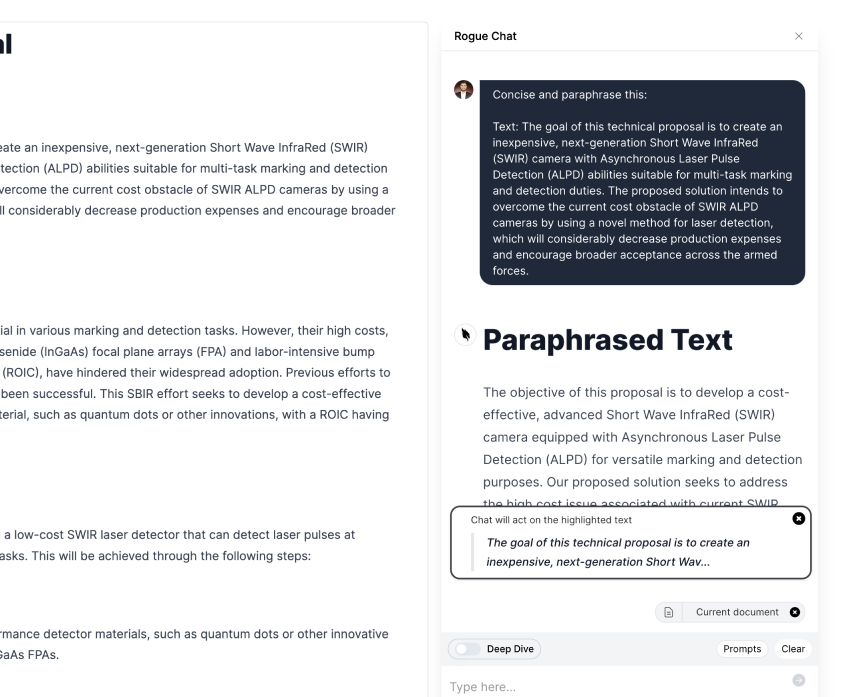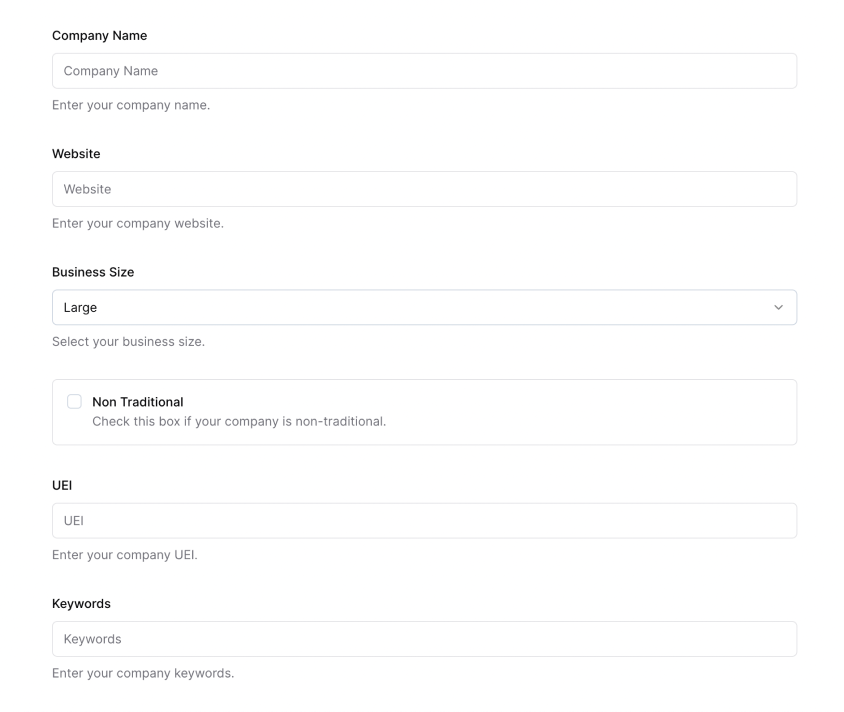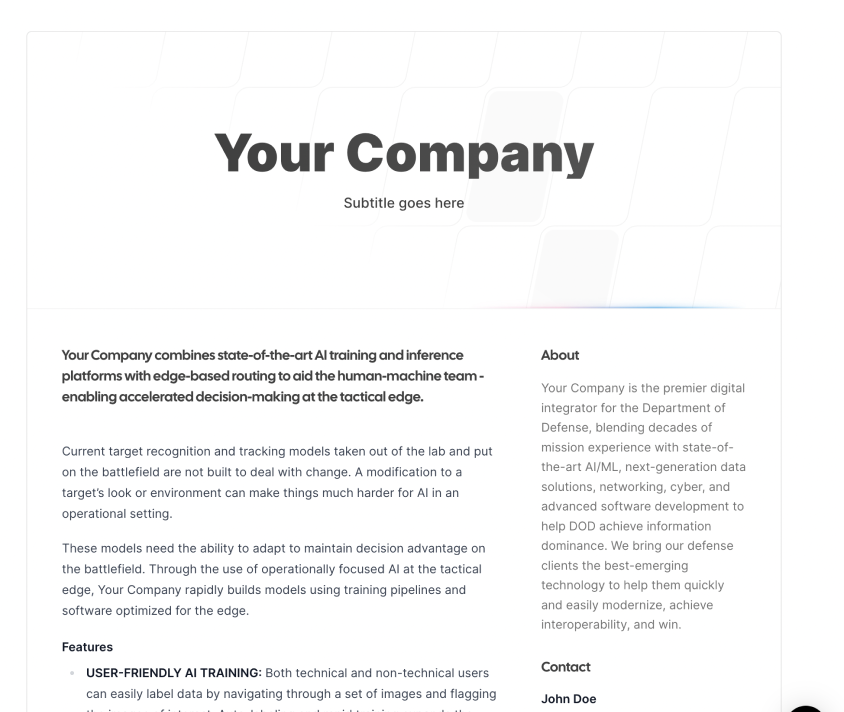
Government Contracting Glossary
There’s a lot of jargon in GovCon, here’s a short and simple guide to the most common terms.
Table of contents
- Introduction
- Section 1: Basic Terms in Government Contracting
- Section 2: Common Procurement Terms
- Section 3: Contract Types and Pricing Structures
- Section 4: Solicitation and Award Types
- Section 5: Competition
- Section 5: Business Development
- Section 6: Contract Compliance and Performance
- Section 7: Government Contracting Regulations and Programs
Introduction
Government contracting is a complex field that that has a vast array for jargon, terms of art, and colloquialisms that can seem like foreign language to outside entrants. As a businessperson interested in providing goods or services to the government, it's crucial to understand key terms and concepts in this industry.
This comprehensive glossary will cover the most important terms and concepts you need to know to navigate the world of government contracting successfully.
Section 1: Basic Terms in Government Contracting
Government Contract: A legally binding agreement between a private sector company and a government agency to provide specified goods or services. Contracts can be fixed-price, cost-reimbursable, or time and materials.
Prime Contractor: The main company awarded a government contract responsible for managing the project, delivering goods or services, and ensuring compliance with contract terms.
Subcontractor: A company hired by the prime contractor to perform specific tasks, services, or provide goods under the government contract.
Request for Proposal (RFP): A formal solicitation issued by a government agency seeking bids from potential contractors to provide goods or services. The RFP outlines project requirements, evaluation criteria, and submission guidelines.
olicitation: An official government document inviting businesses to submit bids, proposals, or quotations for a specific project. Solicitations can be issued as RFPs, Requests for Quotations (RFQs), or Invitation for Bids (IFBs).
Bid or Proposal: A formal response submitted by a company to a solicitation detailing their capabilities, pricing, and work plan to meet the government's requirements.
GovCon: short for government contracting, refers to the process where private companies provide goods and services to government agencies through contracts, following specific procurement regulations and guidelines to ensure fairness, transparency, and best value for the taxpayers' money.
Section 2: Common Procurement Terms
Procurement: The process by which government agencies acquire goods or services from private sector companies through contracts.
Contracting Officer (CO): An authorized government representative responsible for negotiating, awarding, administering, and terminating contracts.
Contracting Officer Representative (COR): is an individual appointed by the contracting officer to oversee and monitor a contractor's performance, ensuring compliance with contractual terms and conditions, while serving as a liaison between the contractor and the contracting officer.
Contracting Officer Technical Representative (COTR): is a designated individual responsible for overseeing and monitoring the technical aspects of a contract, ensuring that the contractor's performance meets the specified requirements and standards
.Federal Acquisition Regulation (FAR): A set of rules and regulations governing the procurement process for federal agencies.
General Services Administration (GSA) Schedule: A pre-negotiated contract program offering streamlined procurement of goods and services to federal agencies from approved vendors at discounted prices.
Competition in Contracting Act (CICA): Legislation that requires federal agencies to promote competition in the procurement process to obtain the best value for the government.
Small Business Set-Asides: Programs that reserve a certain percentage of government contracts for small businesses to encourage their participation in the federal marketplace.
Section 3: Contract Types and Pricing Structures
Firm Fixed Price (FFP) Contract: A type of contract where the price is agreed upon in advance and is not subject to change based on actual costs incurred during performance.
Cost-Reimbursable Contract: A contract where the contractor is reimbursed for allowable, reasonable, and allocable costs incurred during performance. Types include cost-plus-fixed-fee (CPFF), cost-plus-award-fee (CPAF), and cost-plus-incentive-fee (CPIF) contracts.
Time and Materials (T&M) Contract: A contract where the contractor is paid based on actual labor hours worked and materials used during performance.
Indefinite Delivery, Indefinite Quantity (IDIQ) Contract: A long-term contract that allows for an unspecified quantity of goods or services to be ordered over a specified period.
Blanket Purchase Agreement (BPA): A simplified method of purchasing goods or services on an as-needed basis from pre-qualified vendors with established pricing.
Section 4: Solicitation and Award Types
SBIR: Small Business Innovation Research program that offers non-dilutive funding to small businesses for research and development projects.
OTA: Other Transaction Authority, a flexible procurement method used by the Department of Defense and other agencies to acquire innovative technologies or research.
CRADA: Cooperative Research and Development Agreement, a partnership between a government agency and a private company to collaborate on R&D projects.
PIA: Partnership Intermediary Agreement, an agreement between a government agency and a non-profit organization to promote technology transfer and commercialization.
Letter Contract: A preliminary, legally binding contract issued before the final contract is negotiated and signed.
IDIQ: Indefinite Delivery, Indefinite Quantity, as described above.
MAC IDIQ: Multiple Award Contract Indefinite Delivery, Indefinite Quantity, an IDIQ contract awarded to multiple contractors.
MAS IDIQ: Multiple Award Schedule Indefinite Delivery, Indefinite Quantity, an IDIQ contract under the GSA Schedule program.
GSA Schedule: As described above.
Full and Open Competition: A procurement process where all qualified vendors are allowed to submit bids or proposals.
Small Business Set Aside: As described above.
Sole Source: A procurement method where only one contractor is deemed capable of providing the required goods or services, leading to a non-competitive award.
Single Award: A contract awarded to only one contractor.
Multiple Award: A contract awarded to two or more contractors.
Section 5: Competition
Full and Open Competition: A term indicating that all responsible sources are permitted to compete, including large businesses. The Government utilizes full and open competition in order to obtain the best price and the best product or service.
Pre-solicitation: A notice regarding a contract opportunity that will open for proposals in the future. This allows the government to determine contractor interest and capability of work to be performed.
Sources Sought Notice: A synopsis posted by a Government agency that states they are seeking possible sources for a project. It is not a solicitation for work, nor is it a request for proposal. The Government uses sources sought notices to identify small businesses when determining whether to establish a set-aside acquisition.
Small Business Set-Aside: The Government uses this term to reserve an acquisition exclusively for participation by Small Business Concerns (SBCs). A small business set-aside may be open to all small businesses.
Broad Agency Announcements (BAAs): An announcement from an agency about their research interests, including the selection criteria for proposals and an invitation to any potential providers who could meet the Government's requirements, is known as a BAA. It typically relates to R&D and outlines the Government's problem or research area of interest.
Special Notices: These notices give details about industry events and other information that may be relevant to a particular bidding opportunity, even if it is not included in another funding announcement.
Request for Information (RFI): A Request for Information (RFI) is a way for a Government agency to gather data such as prices, delivery times, and abilities of companies, without the intention of immediately awarding a contract. Submissions of this type are not legally binding and cannot be accepted by the Government. However, they do provide a chance to demonstrate your company's capabilities to the Government.
Requests for Proposals (RFPs): In negotiated acquisitions, the government uses Requests for Proposals (RFPs) to communicate their needs to potential contractors and to receive bids. When examining the RFP, keep an eye out for the expiration date, who to contact, an outline of the product or service, the amount of the award, where work is to be performed, and its eligibility for set-asides. The government provides a Statement of Work (SOW) which all vendors must follow when submitting their proposal.
Requests for Quotes (RFQs): An RFQ (Request for Quote) is a request for information with precise description of what is needed in terms of products and services and is typically used for commercially available items.
Other Transaction Agreement (OTA): OTA is a special vehicle used by Government agencies for obtaining/advancing R&D or prototypes. Not a contract, grant, or cooperative agreement, only those agencies with OT authority may engage in Other Transactions.
Best Value: In government contracting source selection evaluation best value is a comprehensive assessment of proposals based on factors such as cost, technical expertise, past performance, and innovation, with the goal of choosing the most advantageous offer that delivers the highest overall value to the government.
Lowest Price Technically Acceptable (LPTA): A government contracting source selection evaluation method where the award is given to the lowest-priced proposal that meets minimum technical requirements, with a higher emphasis on cost than on innovation or past performance.
Section 5: Business Development
Bid-matching Service: Platforms such as Govwin IQ, GovTribe, BidScale, and Bloomberg Government that help businesses identify relevant government contracting opportunities.
Business Development Pipeline: A systematic approach to tracking, evaluating, and pursuing government contracting opportunities at various stages of the procurement process.
Capture Stage: The process of collecting information about an upcoming opportunity, assessing the competition, and positioning your company for success.
Opportunity Assessment: The evaluation of potential government contracting opportunities based on factors such as profitability, win probability, and strategic fit.
Opportunity Shaping: the proactive process of influencing a procurement's requirements, scope, and evaluation criteria to align with a company's strengths and capabilities, ultimately increasing the likelihood of winning the contract while delivering added value to the government agency.
Proposal Stage: The process of drafting and submitting a bid or proposal in response to a government solicitation.
Proposal Writing Color Teams: A collaborative approach to proposal development involving different teams that review and provide feedback on proposal drafts.
- Blue Team: Responsible for strategy development, competitive analysis, and creating a win theme for the proposal.
- Pink Team: Conducts the initial draft review, focusing on content, compliance, and presentation to ensure alignment with the customer's requirements.
- Red Team: Performs a critical review of the proposal's content, ensuring accuracy, clarity, and persuasiveness, while identifying any weaknesses or gaps.
- Green Team: Reviews and evaluates the proposal's pricing and cost structure, ensuring competitiveness and alignment with the overall win strategy.
- Gold Team: Conducts the final, executive-level review of the proposal, focusing on strategic alignment, win themes, and overall quality to ensure a winning submission.
- White Team: Provides an independent, objective review of the proposal, evaluating its overall effectiveness, and identifying any areas for improvement or lessons learned.
Check out more details from the OG: https://www.shipleywins.com/blogs/color-team-reviews-who-to-invite-and-why/
Capture Team: a group of dedicated professionals who strategize, plan, and pursue contract opportunities by analyzing client needs, assessing competitive landscape, and directly engaging with customers and industry partners to shape opportunities. This team may or may not directly write the proposal.
Bid and Proposal Team: a specialized group of professionals responsible for preparing and submitting comprehensive, persuasive, and compliant proposals, showcasing a company's capabilities, expertise, and value proposition to secure government contracts. Often consists of a Proposal Manager, Technical Writer, Pricer, and various review participants
Section 6: Contract Compliance and Performance
Performance Work Statement (PWS): A detailed description of the specific tasks, outputs, and performance standards required for a government contract.
Statement of Work (SOW): A document that outlines the scope, objectives, deliverables, and performance requirements for a government contract.
Quality Assurance Surveillance Plan (QASP): A plan that outlines the government's approach to monitoring and evaluating the contractor's performance against the contract requirements.
Contract Disputes Act (CDA): Legislation governing the resolution of disputes between contractors and government agencies related to contract performance or interpretation.
Termination for Convenience: The government's right to terminate a contract without cause before completion, typically resulting in payment for work performed up to the termination date.
Termination for Default: The government's right to terminate a contract when the contractor fails to meet its obligations, which can result in financial penalties and future contracting restrictions.
Section 7: Government Contracting Regulations and Programs
Buy American Act: Legislation requiring federal agencies to prioritize the purchase of U.S.-made products and materials.
Trade Agreements Act (TAA): Legislation that governs the procurement of goods and services from foreign sources under certain trade agreements.
Prohibitions of Certain Telecommunications: Restrictions on the use of certain telecommunications equipment from companies deemed national security threats in government contracts.
NIST 800-171: A set of cybersecurity requirements for contractors handling sensitive but unclassified government information.
CMMC 2.0: The Cybersecurity Maturity Model Certification, a standardized cybersecurity framework for companies seeking to do business with the Department of Defense.
Sign up for Rogue today!
Get started with Rogue and experience the best proposal writing tool in the industry.



